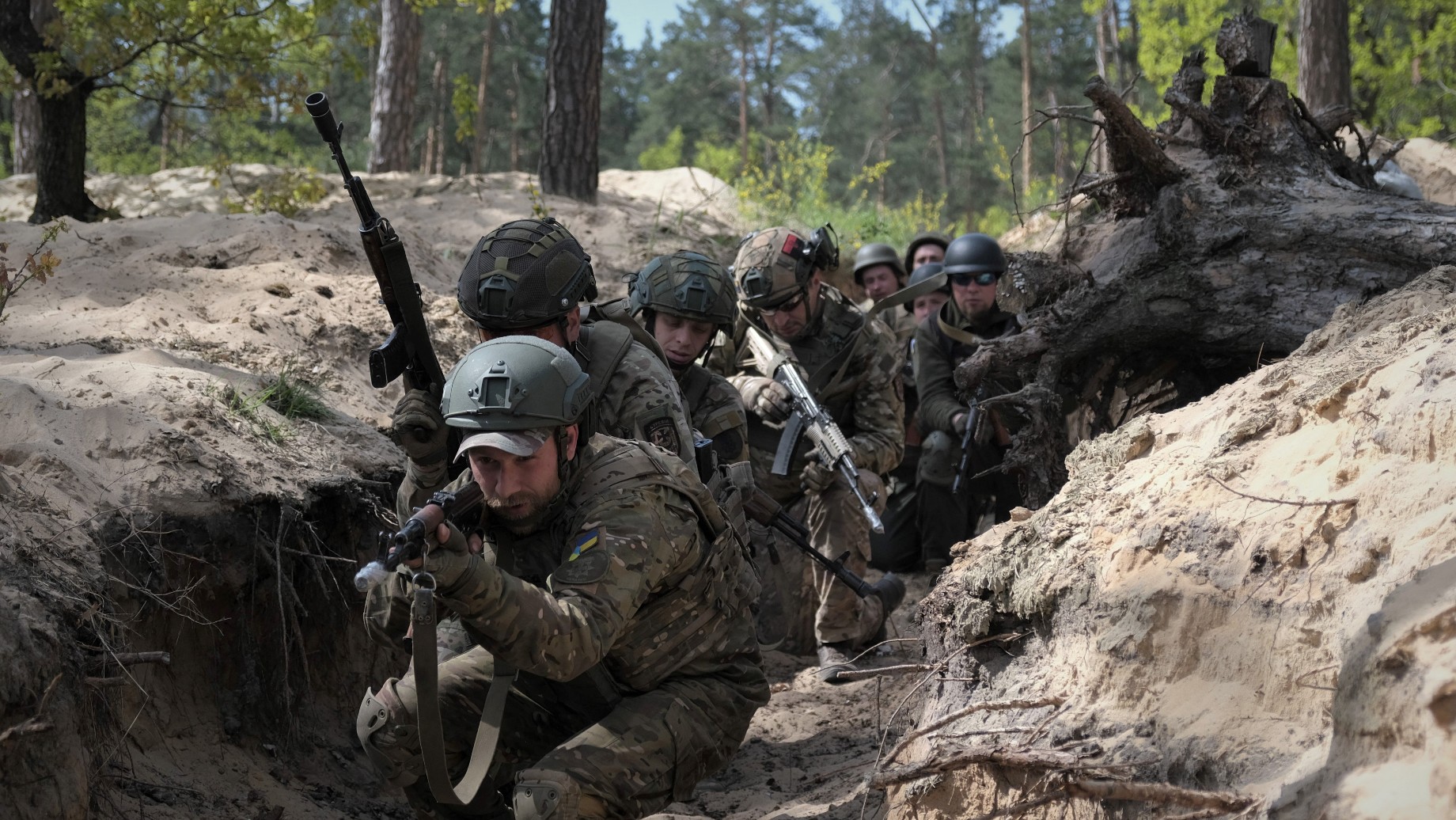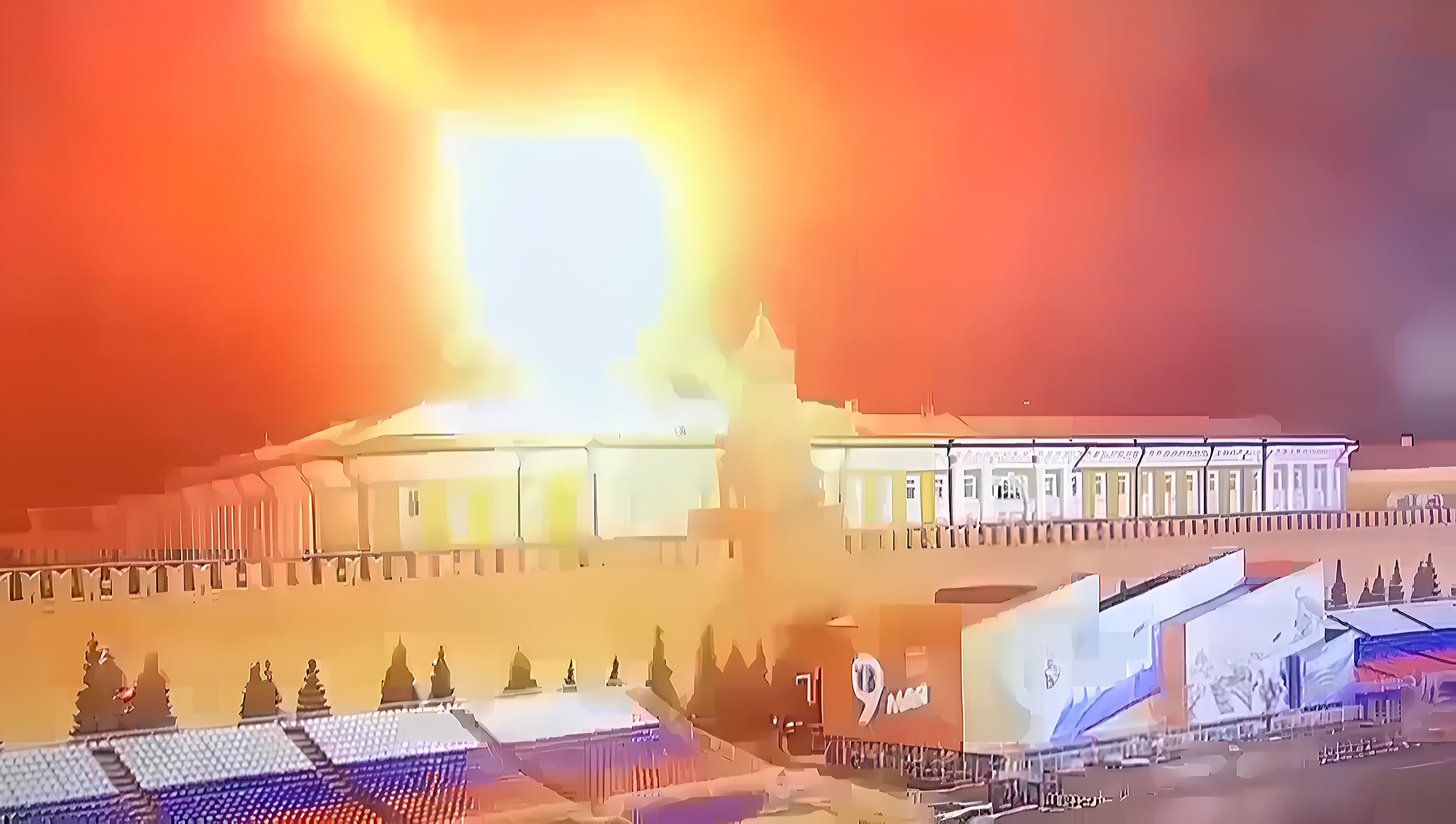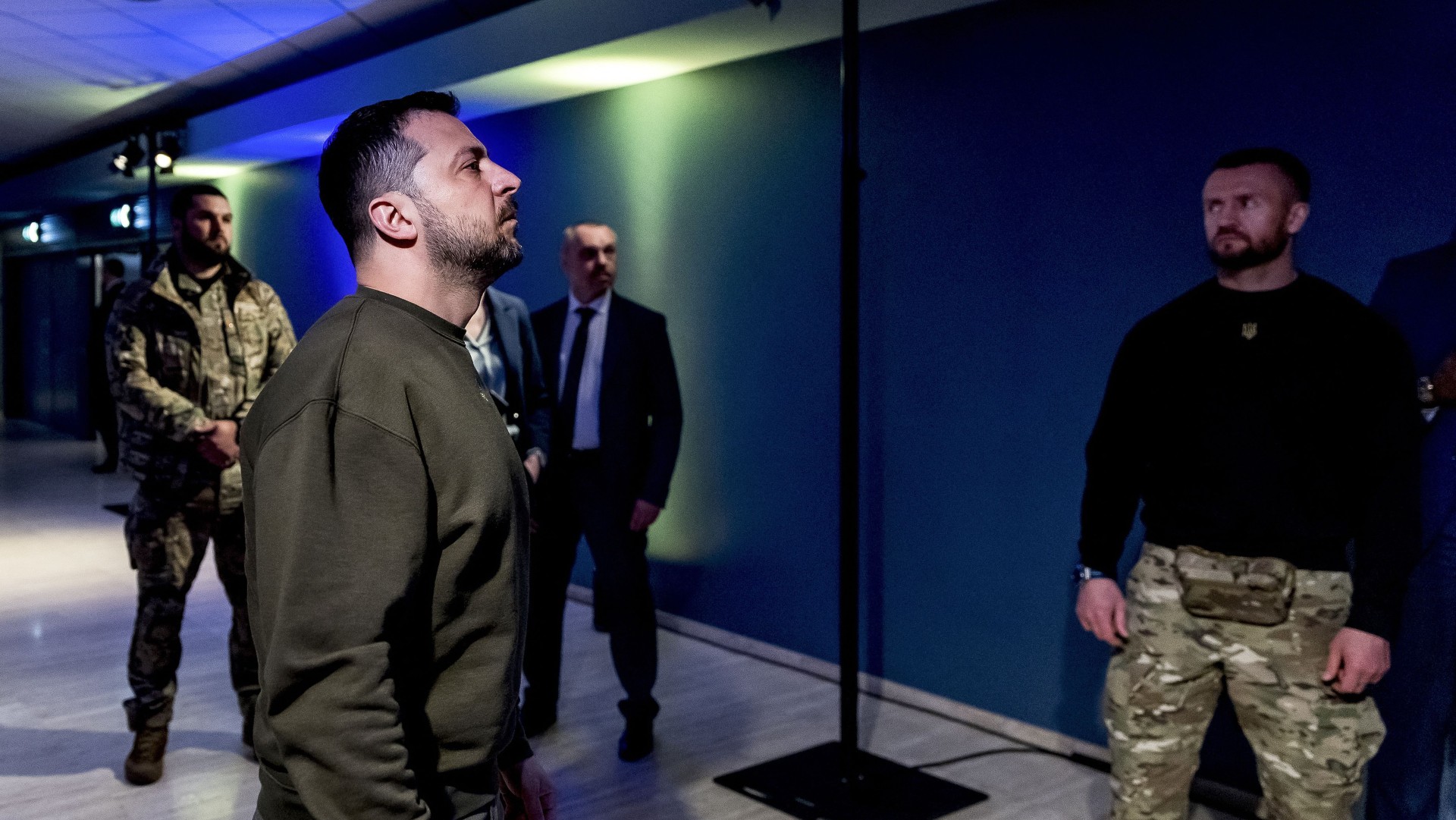The mystery Kremlin drone attack and Ukraine’s crucial counteroffensive
Russia prompts furious guessing game ahead of Kyiv’s push to regain occupied ground

A free daily email with the biggest news stories of the day – and the best features from TheWeek.com
You are now subscribed
Your newsletter sign-up was successful
Explosions were heard across Ukraine last night after Russia accused Kyiv of trying to assassinate President Vladimir Putin with a drone attack on the Kremlin.
Ukraine has denied any involvement and said its air defences were subsequently forced to shoot down 18 out of 24 kamikaze drones launched by Moscow in a pre-dawn attack this morning.
“We don’t attack Putin, or Moscow. We fight on our territory. We are defending our villages and cities,” responded the Ukrainian president Volodymyr Zelenskyy during what The Washington Post called an “unannounced visit” to Finland and The Hague.
The Week
Escape your echo chamber. Get the facts behind the news, plus analysis from multiple perspectives.

Sign up for The Week's Free Newsletters
From our morning news briefing to a weekly Good News Newsletter, get the best of The Week delivered directly to your inbox.
From our morning news briefing to a weekly Good News Newsletter, get the best of The Week delivered directly to your inbox.
Kremlin drone attack
Russia branded the Wednesday morning attack on the Kremlin “an unsuccessful assassination attempt against Putin and promised retaliation for what it termed a ‘terrorist’ act”, said the Post. Putin’s spokesman Dmitry Peskov also “wildly” accused the US of masterminding the incident, said the Daily Beast, prompting the White House to insist it was not “encouraging or enabling Ukraine to strike beyond its borders”.

The footage of the Kremlin attack is “spectacular”, prompting “a furious guessing game and already a welter of conspiracy theories”, said Dominic Waghorn, international affairs editor at Sky News. “Did Russia stage the attack?” he asked. It was “certainly filmed from almost every direction” and “will also be useful for the Putin regime as it tries to tamp down Victory Day commemorations next week”.
Shashank Joshi, defence editor for The Economist, said he was keeping an “open mind” and that people were “underestimating” the degree to which some Ukraine officials have been conducting attacks on Russian soil. This is seen by some as an opportunity to “puncture” the Kremlin’s sense of immunity from the war, he told the BBC World Service’s Newshour.
But the Institute for the Study of War believes it was staged “in an attempt to bring the war home to a Russian domestic audience and set conditions for a wider societal mobilisation”.
A free daily email with the biggest news stories of the day – and the best features from TheWeek.com
Indeed, the “coming weeks may threaten Putin regime like never before”, said Sky’s Waghorn, as Ukraine is “limbering up with a mass of Western weaponry to do its worst”.
The counteroffensive
Ukraine is preparing to launch its counteroffensive against Russian forces, said The New York Times – and the future of the war hinges on its outcome.
According to leaked Pentagon documents, 12 new Ukrainian brigades of 4,000 soldiers each, trained and supplied by the US and its Nato allies, are ready to go to war. Although shrouded in secrecy, “the operation is likely to unfold in the country’s south”, near the Black Sea coast and Russian-occupied Crimea.
The hope is that these troops can penetrate Russian defences in one or more places along the 600-mile front line, said David Axe in The Daily Telegraph. If they succeed, “tanks and infantry can pour through into the enemy’s undefended rear areas” and split its forces in two. In military parlance, this is a “breach” – and achieving it is “one of the most complex and riskiest missions in land warfare”.
Before it can even start, “engineers have to clear a path through the mines”, flatten obstacles and fill trenches – “all while under enemy fire”, said Axe.
The likelihood of success
Publicly, the Ukrainians are “bullish” about their long-anticipated offensive, said Mark Galeotti in The Sunday Times. They have more than 230 new Western tanks and 1,550 armoured vehicles. And so far, Ukraine’s military has out-thought and out-fought the Russians at nearly every stage of the war. But the chances of achieving another major success, like last September’s Kharkiv offensive in the northeast, are small.
Leaked US documents suggest the counteroffensive is likely to make only “modest territorial gains”. The Russians have more soldiers and a far larger air force, and the Ukrainians may not even have enough missiles and shells: they “expend more 155mm shells in a month than America produces in a year”.
Yet despite the risks, President Zelenskyy has no choice but to press on, to give his Western backers what is “rather tastelessly” known as a “return on investment”: to prove they can fight on and win.
On the other side, though, the Russian military “is running on empty”, said Jonathan Sweet and Mark Toth in the Kyiv Post. The US estimates that more than 20,000 Russian soldiers have been killed since December, said the BBC; by comparison, Russia lost around 14,500 during its decade-long Afghan war. And now the Russian advance has stalled.
The Ukrainians need a military success “with enough symbolic power to force change in Russia”, said Anne Applebaum and Jeffrey Goldberg in The Atlantic. A successful counteroffensive could not just change the course of the war, but “alter geopolitics for a generation”. Ukraine’s allies must do everything in their power to ensure that it goes to plan.
Drumming up support
In the Netherlands, Zelenskyy has delivered a speech entitled “There is no peace without justice”. He is also visiting the International Criminal Court, which issued an arrest warrant for Putin in March.
The “wartime leader has visited the US and several EU countries in a bid to drum up support” since the invasion began, said Politico.

Back in Ukraine, explosions were heard in Kyiv as well as the Ukrainian cities of Zaporizhzhia and Odesa in the south overnight. Serhiy Popko, head of the Kyiv city military administration, wrote on Telegram that the capital had “not experienced such a heavy intensity of attacks since the beginning of this year”, but that there had been no civilian casualties.
Both sides have “stepped up air attacks” ahead of the expected counteroffensive by Kyiv, said the Financial Times. A year into Russia’s “full-scale invasion” of the country, “much is riding” on the long-anticipated operation.
-
 Political cartoons for February 20
Political cartoons for February 20Cartoons Friday’s political cartoons include just the ice, winter games, and more
-
 Sepsis ‘breakthrough’: the world’s first targeted treatment?
Sepsis ‘breakthrough’: the world’s first targeted treatment?The Explainer New drug could reverse effects of sepsis, rather than trying to treat infection with antibiotics
-
 James Van Der Beek obituary: fresh-faced Dawson’s Creek star
James Van Der Beek obituary: fresh-faced Dawson’s Creek starIn The Spotlight Van Der Beek fronted one of the most successful teen dramas of the 90s – but his Dawson fame proved a double-edged sword
-
 New START: the final US-Russia nuclear treaty about to expire
New START: the final US-Russia nuclear treaty about to expireThe Explainer The last agreement between Washington and Moscow expires within weeks
-
 What would a UK deployment to Ukraine look like?
What would a UK deployment to Ukraine look like?Today's Big Question Security agreement commits British and French forces in event of ceasefire
-
 Would Europe defend Greenland from US aggression?
Would Europe defend Greenland from US aggression?Today’s Big Question ‘Mildness’ of EU pushback against Trump provocation ‘illustrates the bind Europe finds itself in’
-
 Is conscription the answer to Europe’s security woes?
Is conscription the answer to Europe’s security woes?Today's Big Question How best to boost troop numbers to deal with Russian threat is ‘prompting fierce and soul-searching debates’
-
 Trump peace deal: an offer Zelenskyy can’t refuse?
Trump peace deal: an offer Zelenskyy can’t refuse?Today’s Big Question ‘Unpalatable’ US plan may strengthen embattled Ukrainian president at home
-
 Vladimir Putin’s ‘nuclear tsunami’ missile
Vladimir Putin’s ‘nuclear tsunami’ missileThe Explainer Russian president has boasted that there is no way to intercept the new weapon
-
 The Baltic ‘bog belt’ plan to protect Europe from Russia
The Baltic ‘bog belt’ plan to protect Europe from RussiaUnder the Radar Reviving lost wetland on Nato’s eastern flank would fuse ‘two European priorities that increasingly compete for attention and funding: defence and climate’
-
 How should Nato respond to Putin’s incursions?
How should Nato respond to Putin’s incursions?Today’s big question Russia has breached Nato airspace regularly this month, and nations are primed to respond